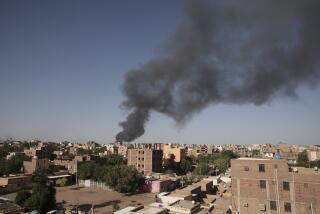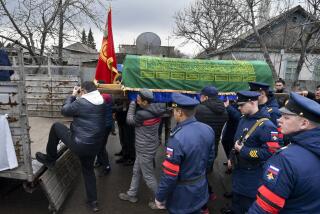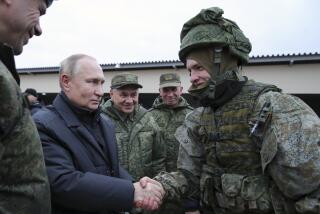226 Soviets Get a Smooth Escort Out of Kuwait : Evacuation: The trip was hot but well-organized, they say. Iraqi soldiers reportedly treated them well.
MOSCOW — After a smooth journey that might have resembled a guided tour if not for the Iraqi military escort, the first 226 Soviet evacuees from Kuwait flew back to the motherland on Saturday, unshaven, travel-worn and marveling at the ease of their exit.
In contrast to harrowing tales of rape and robbery by escaped Westerners, the returnees said Iraqi soldiers had never failed to treat them with respect--and had even speeded their way by helping them jump the lines at crammed gas pumps and at the border crossing into Jordan.
“It was wonderful,” engineer Vadim P. Danilov said, reassuring a group of relatives still hopefully awaiting passengers in the arrival area of the Moscow airport. “They escorted us to the border, and we didn’t have to wait for formalities.
“Everything was very good. The Iraqi order doesn’t allow foreigners leaving the country to take their belongings, but our representative persuaded them to let ours go,” Danilov said.
Despite the VIP treatment given the first planeload of returnees from Kuwait, it was unclear how the 8,000 Soviet nationals in Iraq itself would be affected by the potential hostage crisis surrounding Americans and other foreign residents. Soviet officials have said that women and children have been granted permission to leave Iraq, but some 5,000 Soviet men are being held there, and their fate is still under negotiation.
Soviet television on Saturday condemned the Iraqi detention of foreigners and threats to use them as shields to prevent attacks on key military and industrial targets.
“The desire of the Iraqi military clique to hide behind the backs of unarmed civilians who have been turned into hostages arouses indignation,” an anchorman on the nightly news said.
A Soviet Foreign Ministry spokesman, asked to react to reported Iraqi threats against foreigners, said only that if they were serious, it would be a cause for worry.
“This will probably become another reason for concern over the further development of events in the region,” the unidentified spokesman told the state-run news agency Tass. “We realize that the point in question is the safety of thousands of people, and the possibility of actions from both sides that could lead to another escalation of tension.”
Many of the oil workers and their families who left the Ilyushin 86 that rolled into Moscow’s Sheremetyevo Airport on a special flight from Jordan had a tired but nonchalant air that contrasted with the jumpy nerves of the relatives who met them with flowers and embraces.
“It was safe,” said Valery Mayer, 42, who worked as an engineer at a Kuwaiti gas-processing plant. “We heard very little gunfire, and mostly at night. The Iraqis treated us with respect. There was no fear they would touch us.”
His wife, Ludmila, who flew 1,300 miles from their home in the oil-rich Tyumen region to meet him, said she had been so anxious about Valery’s safety that it had been “dangerous” to her health to watch coverage of the Persian Gulf crisis on television.
But Danilov said, “The situation is quiet in Iraq.”
Other evacuees said their journey’s only real difficulty was the suffocating heat in the buses that took them the 1,120 miles from Kuwait to Baghdad to Amman.
Danilov said the schedule of departures for Soviet citizens was carefully worked out and meals and cargo transport were well organized, with local authorities leasing out additional buses, helping with vehicle repairs and providing a military escort as far as the Iraqi-Jordanian border.
The buses had to stop often in the 110-degree swelter to cool their engines, he said. But when they reached gas stations crammed with thousands of fleeing motorists, “we were refueled ahead of the line because of Iraqi policy.”
“The organization of the escort was perfect,” construction worker Alexander Kell said. “There were no delays.”
More to Read
Sign up for Essential California
The most important California stories and recommendations in your inbox every morning.
You may occasionally receive promotional content from the Los Angeles Times.










